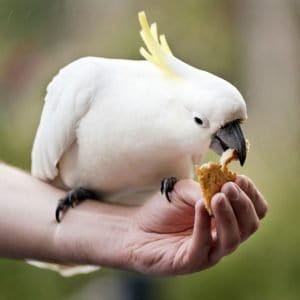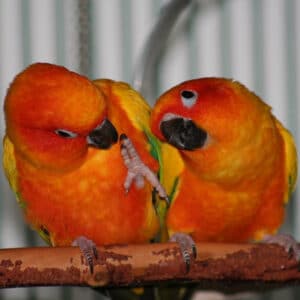Last Updated on by Catherine Tobsing
We don’t generally interact with mainstream bird rescue organizations.
The last bird club/rescue meeting I spoke at began with a police presence called by the current president trying to forcibly remove the former president, who wouldn’t leave.
The next 15 minutes resulted in parliamentary maneuvers so legal action could be brought against the former bird rescue president.
We’ve seen that a lot over the years.
Which is why we mainly work with private rescues and bird rescue initiatives.
We don’t deal with the politics of bird clubs and rescues
We find homes with qualified caregivers for birds that need them
When “parrot” is part of the name of your company you get calls from:
Chicago police and Chicago fire on a regular basis to literally “rescue” birds from any number of entrapments.
We rescued our cockatiel Popcorn when she got stuck in thick bushes in front of a condominium building.
I pulled a cockatiel out of a dumpster.
I’ve grabbed a budgie off the ledge of a building.
As a more granular example, Wednesday morning 8/22/18 a customer/friend mentioned to Catherine (my wife) that a woman had died with seven birds in her home that now require rehoming.
Karrie Noterman who produces OHPA bird fairs had just left Pennsylvania on the way to the woman’s Columbus Ohio suburban home in the hope of enabling the rehoming of all seven birds before the authorities got there.
Catherine had been coveting a ringneck ever since we rescued Peaches our Senegal who rejected her as well as all other humans and birds for an monogamous love affair with me.
Catherine had ringnecks for more than 20 years prior to our meeting one another.
She hand fed Sunshine, a Lutino (yellow) male ringneck who along with Honey a female Lutino ringneck were her flock when we met.
Catherine ended up introducing Honey into a breeding program because all she did was make Sunshine crazy.
Sunshine due to a unique set of circumstances had become a plucker but was lovable nonetheless although only for Catherine.
He never embraced me as a “mate”.
Catherine has coveted another ringneck since Sunshine’s death.
Fast forward: in less than 25 hours I drove 800 miles coming home with a beautiful male African ringneck we have renamed Keto.
here’s a brief video of the actual rescue
Peaches our Senegal parrot came from a “private” rescue as well.
The woman who runs a rescue knew us and about Popcorn’s passing and felt we were ready for a new bird and contacted us.
Less than a week later while driving into the city to have three of her Moluccan cockatoos examined by an avian vet here she stopped by and dropped off Peaches and Eggs (budgie number two).
So yes I get the bird rescue thing but we’re way off base here with our plans and bonding.
The first red flag when reading this Quora thread is that there is no mention of your acquiring a Timneh or Congo African grey.
The two species have significant size differences and require slightly different interior cage accessories, food, and toys.
Another red flag was “My teenage daughter will co-bond with the bird with me so we have a lifetime plan for it.”
Birds especially African greys generally do not co-bond.
Greys choose their mates, like most birds.
Further, anyone who has studied African greys knows they are unique in that bonding preferences change at or five or six years of age.
The re-bonding at 5 or 6 makes them one of the more durable species because it helps avoid incestual relationships.
In-breeding weakens species.
In other words, African greys don’t do three ways.
Greys will interact with other family members but they will only have a single bonded bird or human if they bond with them at all.
Are we to assume that you and your teenage daughter will spend the rest of your lives together?
If your daughter were to attend college, what would be the implications of a bonded mate disappearing for four years?
Will she ever get married and no longer live with the grey?
I actually know of an African grey being relinquished in the very near future from an elderly individual who is no longer physically able to care for the bird.
I know people looking for Grey’s.
I don’t know if you’re looking for a Congo or Timneh.
There’s about 600 species of parrots.
Anyone who wants to bring a bird into their home would be advised to wrap their head around that fact.
There can be a weight difference of 100 g or more (the weight of a fat cockatiel) between CAGs and Timmys.
They have slightly different bird cage/cage environmental and nutritional needs.
With that out of the way let’s look at your lifetime plan.
What is the bird’s out of the cage and environment going to be like?
Do you have plans to have bird play stands in rooms that the birdcage is not in?
Are you going to keep your bird flighted or will you lop off its wings?
If you want to keep it flighted, is your home conducive to a flighted bird?
Windows stretching up to 10 foot ceilings are not conducive to a flighted bird.
We have 8 flighted bird in our living room and we keep shades pulled, shutters closed and plants in front of Windows.
We’ve add LED soft lighting lamps to brighten the room because of being sunlight deficient.
Is that a sacrifice you are willing to make?
When your home’s front door or back door is open, what are the protections you provide your bird so that it doesn’t fly out?
Birds enjoy routine.
We feed our birds seven days a week in the morning and refresh their food and water seven days a week in the evening.
Are you prepared to make that commitment?
With the other (prior) birds, did you spend any time training them with a clicker?
Were you weighing your cockatiels and budgies regularly recording their weights?
What happened to those birds?
Are they still part of your flock or were they disposed of to be replaced with a larger parrot?
Some of the things I read in this thread were “inaccurate”.
“El Cheapo imports from places like China often contain lead in the welds,” is misleading.
There are very few bird cages being manufactured in the United States, with most all bird cages being manufactured in China and of late, Vietnam and India.
I’m not going to try to convince you that these import cages are safe but I just want you to think about the fact that companies like Walmart and Amazon are not naïve enough to sell just “any” birdcage.
These major Internet vendors (a category my company belongs to) have a fiduciary liability which means we don’t want to hurt or kill your birds because we don’t want to get sued for killing someone’s pet.
I’m also tired of hearing the words “seeds and nuts, aka the death diet”.
What do you think some birds eat in the wild?
Did you know Australian grass parakeets live primarily on grass seed and have done so for millions of years?
There are no pellet trees in the rainforest.
What’s your personal parrot knowledge base?
Feel free to reach out if you’d like to make this discussion even more specific.
BTW – here’s a DIY highly effective air purifier on the cheap
Read other answers to this question on Quora
Thank you for giving me so many things to consider.
I was planning on a CAG. I am in no rush to jump into anything –
– I have been considering a CAG since I was a teenager, and haven’t taken the plunge yet. Our cockatiel and budgie will stay with us.
My biggest concern holding me back has always been whether or not I would be able to devote all the time a CAG needs.
I had already pretty much talked myself out of it before your answer.
I am disheartened to know there is not a good way to have these birds form a strong attachment to more than one person (I do get the mating for life aspect).
That makes me question the ethics of ever having any such bird in captivity.
Lynn P
Admittedly it is a slippery slope.
Our philosophy is rather than seeking out a bird, we let the bird find us which has happened eight times now over the past 18 months.
If there is a rescue or rescues in your area spend some time there to see if a bird would be a match for you.
Join some African gray Facebook groups and make your intentions known.
Our recently rescued African ringneck came about because we have relationships with many people in the captive bird world.
If there are pet stores that sell birds in your area visit them and see if any birds are a match for you.
You can always take the path of reaching out to a breeder in the hopes of acquiring a baby bird that allows you to hand feed it and bond with it a very young age.
Ask yourself if there’s a reason that “African greys” are the species you are seeking.
We have a friend that has never had a bird but recently acquired a Timneh grey and who is having a great relationship with the bird.
One of her strengths is that she runs a world-class daycare and is used to dealing with young humans still in their development stage which mimics highly intelligent birds like African greys.
Trust me, the perfect bird will find you if enough people know you are looking.
Author Profile
Latest entries
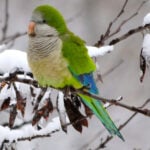 The Traveling BirdJune 26, 2025Can You Name 5 Parrot Species That Are Living Wild in the USA?
The Traveling BirdJune 26, 2025Can You Name 5 Parrot Species That Are Living Wild in the USA?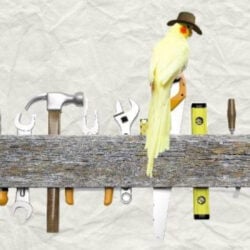 Bird BehaviorJune 26, 2025How is it Parrots Are Problem Solvers Social Animals and Even Use Tools?
Bird BehaviorJune 26, 2025How is it Parrots Are Problem Solvers Social Animals and Even Use Tools?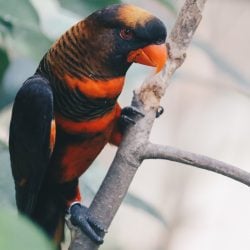 Bird & Parrot AnatomyJune 25, 2025How a Tiny Chemical Modification Makes Parrots Nature’s Living Paintings
Bird & Parrot AnatomyJune 25, 2025How a Tiny Chemical Modification Makes Parrots Nature’s Living Paintings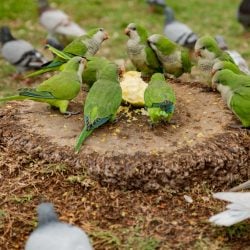 PigeonsJune 20, 2025How Do Parrots Thrive in Cities Outside Their Native Habitats?
PigeonsJune 20, 2025How Do Parrots Thrive in Cities Outside Their Native Habitats?

